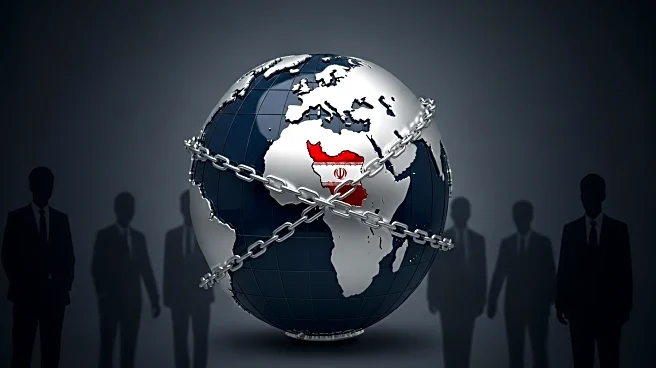What's Happening?
The Trump administration has announced new sanctions targeting Iranian companies and individuals involved in missile and military aircraft production. This move supports the United Nations' recent reimposition of penalties against Iran due to its nuclear program activities. The UN's 'snapback' measures include freezing Iranian assets abroad, halting arms deals, and penalizing the development of Iran's ballistic missile program. The U.S. Treasury Department has named 21 entities and 17 individuals involved in networks procuring technology for advanced missile systems and the illegal purchase of a U.S.-manufactured helicopter. These sanctions affect networks operating out of Iran, Hong Kong, China, Germany, Turkey, Portugal, and Uruguay.
Why It's Important?
The sanctions are significant as they aim to curb Iran's military capabilities and nuclear ambitions, which are perceived as threats to regional and global security. The measures could further isolate Iran economically, as its currency, the rial, is already at a record low, exacerbating food price pressures and daily life challenges for its citizens. The sanctions reflect ongoing international efforts, led by France, Germany, and the United Kingdom, to pressure Iran into compliance with nuclear monitoring and negotiations. The broader geopolitical implications include heightened tensions in the Middle East and potential impacts on global oil markets.
What's Next?
Iran is likely to face increased economic hardship as the sanctions take effect, potentially leading to further domestic unrest. The international community, particularly the UN and Western allies, will continue to monitor Iran's compliance with nuclear agreements and may consider additional measures if Iran fails to meet its obligations. The situation could also influence U.S. foreign policy decisions and diplomatic relations with other countries involved in the sanctions.
Beyond the Headlines
The sanctions raise ethical and legal questions about the effectiveness of punitive measures in achieving long-term peace and stability. They also highlight the challenges of balancing national security interests with humanitarian concerns, as ordinary Iranians bear the brunt of economic sanctions. The situation underscores the complexities of international diplomacy and the need for multilateral cooperation in addressing nuclear proliferation.










